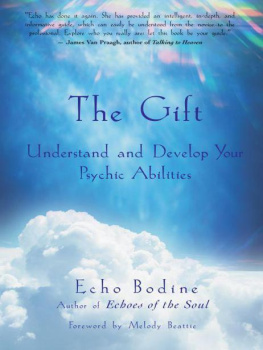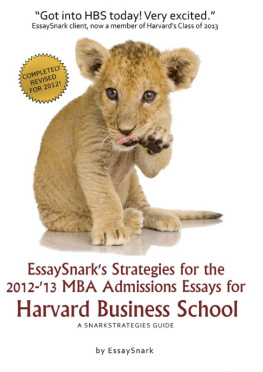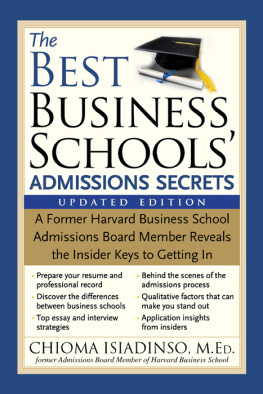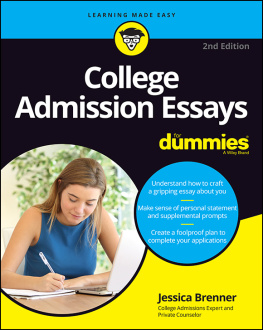Praise from Admissions Officers
for Great Applications for Business School (second edition)
A tour de force. Paul Bodine really understands the inside track and offers his readers a wealth of useful information. The book is thorough and wide-ranging, with lots of useful examples drawn from different business schools. Im sure many candidates will find his advice invaluable. A practical and lively guide to applying to business school.
CAROLINE DIARTE EDWARDS,
DIRECTOR OF ADMISSIONS,
INSEAD
A very thorough and witty explanation of the admissions process on all levels, with excellent advice as to what not to do as well as what to do and how to do it skillfully.
CHRISTIE ST-JOHN,
SENIOR ASSOCIATE DIRECTOR ADMISSIONS & RECRUITING,
DARTMOUTH TUCK SCHOOL OF BUSINESS
Very insightful and a truly useful resource for candidates willing to travel the road of this wonderful leadership degree. Paul Bodines detail-oriented, fact-based approach is a powerful myth debunker that will truly aid those willing to invest their time, and mainly themselves in this amazing, but truly challenging, process. The books Put Yourself on the Couch questions are a very helpful, insightful and a practical tool for self-assessment.
JUAN FERNANDO JIMNEZ,
FORMER ASSISTANT DIRECTOR MBA ADMISSIONS,
HARVARD BUSINESS SCHOOL
Great Applications for Business School has great advice for any student interested in earning their MBA from a top school! Real life examples, suggestions from Admissions Directors and tips for better applications can be found on nearly every page. Help for prospective students can be found inside this book!
RANDALL T. SAWYER,
ASSISTANT DEAN OF ADMISSIONS,
FINANCIAL AID AND INCLUSION,
THE JOHNSON SCHOOL AT CORNELL UNIVERSITY
Praise from Admissions Officers
for Great Applications for Business School (first edition)
Totally on target. Great Application Essays for Business School is a really terrific, practical, and insightful guide to the kind of writing that can make a difference in winning acceptance at a top MBA program. Many of the things recommended in the book are the kinds of things that I say when I speak with prospective applicants. I also love the level of detail. I really recommend ita must-read for anyone with business school ambitions.
ANNE COYLE,
FORMER DIRECTOR OF ADMISSIONS,
YALE SCHOOL OF MANAGEMENT
Paul Bodines Great Application Essays for Business School is a great view from the trenches, and a careful reading will offer many rewards to applicants. His overall messagesamong them be yourself, answer the questions, showcase what you feel is important for schools to knowseem simple but are hard to act on when you are sweating through deadlines. He gives you a practical guide to getting it done. Paul Bodine takes on the essay-writing process and breaks it down into actionable steps. He wants to help you tell your story. Paul knows there is no substitute for hard work and self-reflection, but his book should make an often daunting process much easier. Great Application Essays for Business School is a valuable how-to book with a generous spirit.
JON MCLAUGHLIN,
FORMER ASSISTANT DIRECTOR OF MBA ADMISSIONS,
MASSACHUSETTS INSTITUTE OF TECHNOLOGY,
SLOAN SCHOOL OF MANAGEMENT
Quite effective. If all MBA applicants take to heart Paul Bodines counsel and advice, we would receive far stronger essays, and applicants would likely see even greater success in the MBA admissions process. Great Application Essays for Business School provides an easy-to-follow blueprint for preparing and writing effective essays.
JAMES HOLMEN,
DIRECTOR OF ADMISSIONS,
INDIANA UNIVERSITY,
KELLY SCHOOL OF BUSINESS
Paul Bodine does a terrific job in Great Application Essays for Business School of capturing the essence of the MBA application process. This guide will be useful to every MBA applicant.
NATALIE GRINBLATT,
FORMER DIRECTOR OF THE OFFICE FOR ADMISSIONS AND FINANCIAL AID,
CORNELL UNIVERSITY,
JOHNSON GRADUATE SCHOOL OF MANAGEMENT
Great Applications for BUSINESS SCHOOL
Great Applications for BUSINESS SCHOOL
Second Edition
Paul S. Bodine
paulsbodine.com


Copyright 2011 by Paul S. Bodine. All rights reserved. Printed in the United States of America. Except as permitted under the United States Copyright Act of 1976, no part of this publication may be reproduced or distributed in any form or by any means, or stored in a database or retrieval system, without the prior written permission of the publisher.
ISBN: 978-0-07-174656-4
MHID: 0-07-174656-0
The material in this eBook also appears in the print version of this title: ISBN: 978-0-07-174655-7, MHID: 0-07-174655-2.
All trademarks are trademarks of their respective owners. Rather than put a trademark symbol after every occurrence of a trademarked name, we use names in an editorial fashion only, and to the benefit of the trademark owner, with no intention of infringement of the trademark. Where such designations appear in this book, they have been printed with initial caps.
McGraw-Hill eBooks are available at special quantity discounts to use as premiums and sales promotions, or for use in corporate training programs. To contact a representative please e-mail us at bulksales@mcgraw-hill.com.
This publication is designed to provide accurate and authoritative information in regard to the subject matter covered. It is sold with the understanding that neither the author nor the publisher is engaged in rendering legal, accounting, securities trading, or other professional services. If legal advice or other expert assistance is required, the services of a competent professional person should be sought.
From a Declaration of Principles Jointly Adopted by a Committee of the
American Bar Association and a Committee of Publishers and Associations
TERMS OF USE
This is a copyrighted work and The McGraw-Hill Companies, Inc. (McGraw-Hill) and its licensors reserve all rights in and to the work. Use of this work is subject to these terms. Except as permitted under the Copyright Act of 1976 and the right to store and retrieve one copy of the work, you may not decompile, disassemble, reverse engineer, reproduce, modify, create derivative works based upon, transmit, distribute, disseminate, sell, publish or sublicense the work or any part of it without McGraw-Hills prior consent. You may use the work for your own noncommercial and personal use; any other use of the work is strictly prohibited. Your right to use the work may be terminated if you fail to comply with these terms.
THE WORK IS PROVIDED AS IS. McGRAW-HILL AND ITS LICENSORS MAKE NO GUARANTEES OR WARRANTIES AS TO THE ACCURACY, ADEQUACY OR COMPLETENESS OF OR RESULTS TO BE OBTAINED FROM USING THE WORK, INCLUDING ANY INFORMATION THAT CAN BE ACCESSED THROUGH THE WORK VIA HYPERLINK OR OTHERWISE, AND EXPRESSLY DISCLAIM ANY WARRANTY, EXPRESS OR IMPLIED, INCLUDING BUT NOT LIMITED TO IMPLIED WARRANTIES OF MERCHANTABILITY OR FITNESS FOR A PARTICULAR PURPOSE. McGraw-Hill and its licensors do not warrant or guarantee that the functions contained in the work will meet your requirements or that its operation will be uninterrupted or error free. Neither McGraw-Hill nor its licensors shall be liable to you or anyone else for any inaccuracy, error or omission, regardless of cause, in the work or for any damages resulting there from. McGraw-Hill has no responsibility for the content of any information accessed through the work. Under no circumstances shall McGraw-Hill and/or its licensors be liable for any indirect, incidental, special, punitive, consequential or similar damages that result from the use of or inability to use the work, even if any of them has been advised of the possibility of such damages. This limitation of liability shall apply to any claim or cause whatsoever whether such claim or cause arises in contract, tort or otherwise.
Next page





![Reding - Grads Guide to Graduate Admissions Essays] : Examples from Real Students Who Got into Top Schools](/uploads/posts/book/101661/thumbs/reding-grad-s-guide-to-graduate-admissions.jpg)

